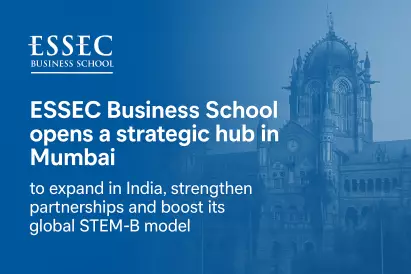Summary: In 2025, Latvia’s master’s degree programs are undergoing key transformations to align with labour market shifts, digital advances, and demographic evolution. This article will cover trends in education delivery, interdisciplinarity, funding, and quality assurance, and will highlight innovations shaping postgraduate education in Latvia.
The Role of Master’s Degrees in Latvia’s 2025 Workforce Strategy
Latvia's master’s programs are critical in bridging higher education with evolving labor market needs. In line with the country's modernization efforts, master's education supports qualification upskilling and helps address demographic challenges, such as labor shortages and an ageing population.
By 2025, Latvia aims for 73% of its 30–34-year-olds to hold high-level qualifications—well above the EU average.
Master’s degrees are increasingly important for competitive roles in science, technology, and emerging sectors, complementing reforms aimed at a more digitally literate and agile workforce.
Programs tied to interdisciplinary fields like sustainable development and health economics are expanding, preparing graduates for labor markets across Europe and beyond.
Emerging Trends in Master’s Degree Education in Latvia
Several key educational trends are shaping Latvia’s postgrad scene in 2025:
- Focus on STEM and tech-driven fields: Emphasis on disciplines like materials science, IT, digital tech, and physics is visible, responding to demand in innovation-heavy sectors.
- Cross-field programs: Courses combining STEM with business or social sciences are surging, equipping graduates for multifaceted roles in sectors such as entrepreneurship or e-business.
- Flexible study models: Online and hybrid learning options expand accessibility for working professionals and international students. Adoption of digital infrastructure surged post-COVID and continues to evolve.
- Global alignment: Latvia adheres to the Bologna Process, ensuring academic recognition across the European Higher Education Area. International collaboration and English-language instruction are increasing.
Programs are also being shaped by rising demand for competency in cybersecurity and data analytics.
Tuition, Scholarships, and Financial Accessibility
The cost of master’s degrees in Latvia varies by discipline and institution. Technical and engineering programs can cost between €2,900 and €5,320 per year.
While certain programs remain state-funded, others require tuition payment.
Scholarship opportunities and EU grants, such as Horizon Europe, are available but limited and competitive.
Institutions must strike a balance between funding sustainability, accessibility, and educational quality.
Latvia continues exploring mechanisms that encourage inclusive access while maintaining innovation. Some programs with a focus on green finance offer targeted support, reflecting EU economic goals.
Shifting Student Demographics and Rising Expectations
Enrolment trends reveal a notable shift: fewer domestic young learners and a growing pool of adult learners and international students.
These demographics have different expectations, seeking flexible models and programs with strong employability outcomes.
Master's students now prioritize practical, up-to-date skills. There is an expectation of exposure to global markets, internships, and interdisciplinary knowledge.
Programs in areas like sports management and tourism management are restructured to reflect international trends and career applicability.
Challenges in the Latvian Master’s Education Ecosystem
Despite promising developments, master’s education in Latvia faces several persistent challenges:
- Affordability: Rising tuition and limited scholarship availability put pressure on prospective students, particularly in high-tech fields.
- Curriculum Relevance: Ensuring that academic content reflects labour market needs—especially around digital and interdisciplinary competencies—remains critical.
- Quality Assurance Online: As more programs move online or adopt hybrid formats, maintaining quality standards is essential.
- Faculty Development: Latent teacher shortages and the need for upskilling challenge institutions. Investments in faculty development and teaching quality enhancement are ongoing.
Master’s programs in fields like innovation and project management are actively integrating employer feedback to address skill mismatches.
Opportunities and Innovations in 2025
Latvia’s education leaders are leveraging several innovation and reform pathways to strengthen the strategic role of master’s degrees:
- Innovative Pedagogies: The rise of digital technology allows for gamified learning, competency-based assessment, and personalized academic experiences.
- Global Collaborations: Joint degrees, research initiatives, and student exchanges broaden access and international relevance. Latvia’s EU and regional ties position it as a knowledge hub.
- Policy Reforms: Funding models, employer-education coordination, and accreditation updates for online formats enhance program flexibility and quality.
- Lifelong Learning: Programs targeting adult learners—such as those in corporate social responsibility or public services—reflect the growing need for career-long upskilling.
These innovations are empowering both traditional students and mid-career professionals to access high-quality education aligned with future industry demands.
Graduate Outcomes and National Benefits
Graduates from Latvian master’s programs enjoy improved career prospects—especially in STEM, business, and management roles. Employers benefit through access to a more specialized, innovative, and competitive labor pool.
These graduates contribute to Latvia’s transformation into a knowledge-driven economy ready for global competition.
By cultivating a flexible, interdisciplinary, and digitally enhanced postgraduate education ecosystem, Latvia serves as a forward-looking model for sustainable national development.
Specialized paths in fields like energy and natural resources and data analytics ensure alignment with both EU policy objectives and global workforce trends.



